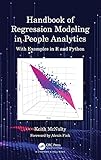Handbook of regression modeling in people analytics : with examples in R and Python / Keith McNulty.
Material type: TextPublisher: [Place of publication not identified] : Chapman and Hall/CRC, 2021Edition: First editionDescription: 1 online resource (xvi, 256 pages)Content type:
TextPublisher: [Place of publication not identified] : Chapman and Hall/CRC, 2021Edition: First editionDescription: 1 online resource (xvi, 256 pages)Content type: - text
- computer
- online resource
- 9781003194156
- 100319415X
- 9781000427899
- 1000427897
- 9781000427929
- 1000427927
- 519.5/36 23
- QA278.2
 Ebooks
Ebooks
| Item type | Current library | Call number | Status | Date due | Barcode | |
|---|---|---|---|---|---|---|
 Ebooks
Ebooks
|
IIM Kashipur | 519.5/36 (Browse shelf(Opens below)) | Available | E4637 |
Browsing IIM Kashipur shelves Close shelf browser (Hides shelf browser)
1. The Importance of Regression in People Analytics. 2. The Basics of the R Programming Language. 3. Statistics Foundations. 4. Linear Regression for Continuous Outcomes. 5. Binomial Logistic Regression for Binary Outcomes. 6. Multinomial Logistic Regression for Nominal Category Outcomes. 7. Ordinal Logistic Regression for Ordered Category Outcomes. 8. Modeling Explicit and Latent Hierarchical Structure in Data. 9. Survival Analysis for Modeling the Occurrence of Singular Events Over Time. 10. Alternative Technical Approaches in R and Python. 11. Power Analysis to Estimate Required Sample Sizes for Inferential Modeling. 12. Further Exercises for Practice.
Despite the recent rapid growth in machine learning and predictive analytics, many of the statistical questions that are faced by researchers and practitioners still involve explaining why something is happening. Regression analysis is the best 'swiss army knife' we have for answering these kinds of questions. This book is a learning resource on inferential statistics and regression analysis. It teaches how to do a wide range of statistical analyses in both R and in Python, ranging from simple hypothesis testing to advanced multivariate modelling. Although it is primarily focused on examples related to the analysis of people and talent, the methods easily transfer to any discipline. The book hits a 'sweet spot' where there is just enough mathematical theory to support a strong understanding of the methods, but with a step-by-step guide and easily reproducible examples and code, so that the methods can be put into practice immediately. This makes the book accessible to a wide readership, from public and private sector analysts and practitioners to students and researchers. Key Features:" 16 accompanying datasets across a wide range of contexts (e.g. academic, corporate, sports, marketing) " Clear step-by-step instructions on executing the analyses. " Clear guidance on how to interpret results. " Primary instruction in R but added sections for Python coders. " Discussion exercises and data exercises for each of the main chapters." Final chapter of practice material and datasets ideal for class homework or project work.
OCLC-licensed vendor bibliographic record.
There are no comments on this title.








